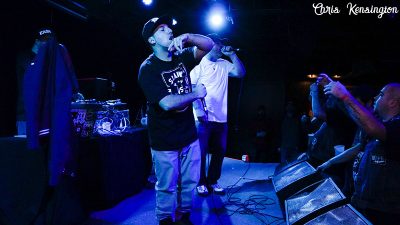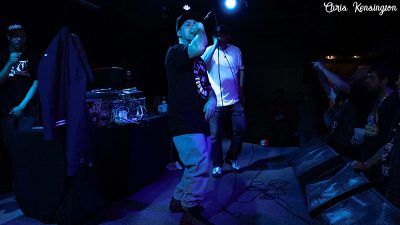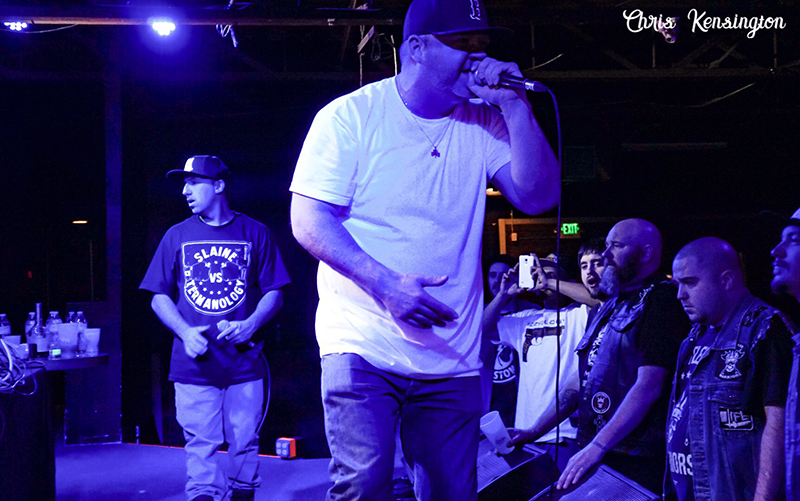Playing Their Roles: Slaine vs Termanology
Music Interviews
Slaine vs Termanology hit the stage at a favorite SLC hangout, The Urban Lounge, on Wednesday, November 15. They came to promote their October release, Anti-Hero, with a tour of the same moniker with a few Utah hip-hop stalwarts and a touring act from Pensacola, Florida, named Big Lo. Local support for the duo from Massachusetts came from Auratorikal tha Ikonoklast & Mixter Mike, Dumb Luck and G. Life, whose association with the nationwide conglomerate known as the Battle Axe Warriors led to an energetic evening of rap activities.
Blessed by a good word from 12Gage Agency, Term and Slaine settled into the green room and allowed SLUG to ask them questions about the new album, their favorite action heroes, where we should eat in their neck of the woods and, of course, what their connection to the valley we call home is.
SLUG: When did you first come to Salt Lake City?
Slaine: The first time I came out was, I think, in ’06 with Special Teamz (Slaine, Ed O.G. and Jayshaun). Street Jesus brought us out.
SLUG: What is it like working with Street Jesus?
Slaine: Yeah, he dejayed on one of the tours that we did a couple years ago. He’s a good dude, chill dude to hang with. I’ve known him for a long time. He’s been holding it down for hip-hop in Salt Lake forever, man. Like, official. He had the store (Uprok) … brought the shows out to Salt Lake and kept shit poppin’ out here for a long time. He’s a solid kid.
SLUG: How did this Slaine vs Termanology Anti-Hero project come about?
Slaine: You know, like I talked about a little onstage. In the beginning, we were coming up at the same time. Actually, I was in Special Teamz, his crew is ST. da Squad, and you know, there was a little issue around that. Then we really didn’t like each other, then … that turned into kind of a rivalry, then into a respect. We got to know each other and we became friends. We identified on the same level, like we were both kinda came up and started to get successful and get hated on a little bit around the way. We worked together several times, and then we eventually ended up working on the album together.
SLUG: Onstage, you described the album as a masterpiece. What’s the definition of a hip-hop masterpiece to you?
Term: For me, it’s almost like a vibe first and foremost. It’s like, can you listen to something and have a good vibe with it? That’s one, but taking it a step further than that, I believe a classic album or an album that’s a masterpiece has to have really high production, really thought-[about] song selection and also conceptual records mixed with lyricism and bars, punchlines, flows, different cadences, storytelling. It has to have a little bit of everything, and I feel like this album definitely has that. Also, there’s a lot of competition between me and Slaine because nobody wants to get washed. Nobody wants to have the worst verse on a song and we have songs with some of the dopest rappers: we got Bun B, we got Everlast, you know, keeping it sharp, young rappers like Chris Rivers and Conway. So when you get on tracks with like, OG’s or even the new cats that are fire, you don’t wanna be the dude with the wack verse.

SLUG: What does it mean to be an anti-hero? Who are some of your favorite anti-heroes that we can all identify?
Slaine: Technically, an anti-hero is somebody who has a purpose or really good intentions and a lotta good characteristics, but they have a tragic flaw. Everybody has their thing that they have to overcome. There’s a lot of great anti-heroes throughout film and television. My favorite would probably be Tony Soprano. I’m a big fan of James Gandolfini. I actually did a movie with him. He was very cool to me.
SLUG: We watched you in Central Intelligence with The Rock and Kevin Hart. Do you have any favorite on-set stories?
Slaine: I uh, I usually keep anything that goes on on set, on set, but I’ve been lucky to be a part of some really cool movies. Like Gone Baby Gone was an amazing experience, working with Ben [Affleck] both times … on The Town, too. The Town was special because I felt like it penetrated pop culture, which is something I never experienced in my music career. It wasn’t something I aspired to really, but [I got] to see how something can get so big [and] to be a part of making it. There were a couple of lines I had the line where the cop is interrogating us and he’s telling me to read the thing, and I say the thing about, “Yous got it all fucked up. I’m tryna make this shit sound authenticious …”
I felt for a while people would come up to me wherever I was, like I’d be in Russia and people would come up to me and say “authenticious!” It was just crazy, man. Obviously, I knew it had the potential for that when I was working on a big movie like that, but it was cool to be a part of that, man. It’s something that I didn’t know that I loved to do. Ben saw me in the newspaper for music stuff, and he just read my backstory and called me in to read . I didn’t know him or anything like that. Through that, I discovered something I love just as much as I love being an emcee. I love acting.
SLUG: Who are some of the rapper-slash-actors that you’ve admired over the years?
Slaine: I loved 2Pac as an actor. I think 2Pac, if he was still alive, would be like Denzel Washington. He was a great actor. I think that was his greatest skill. As great of a rapper as he was, he was phenomenal. He was a top-tier actor. I think he had so much potential as an actor.
SLUG: What do you think is wrong with hip-hop music in general?
Term: I just wish there was a little more diversity in it. Like, I’m not mad at anybody—the old school, the new school, the untalented, the people that are super talented … I’m not mad at anybody. I think everybody has their place in music and everybody has their right to do music, but I wish there was a little more balance; that’s all. Especially considering that they wanna use, you know, our genre as a crutch and use our genre to get money and wanna classify their music as hip-hop. They should at least have some type of standards and pay some type of dues. And, official people who created it or are running it should have some type of stand for it. It should be like, I gotta buncha bread and I’m stupid wack, but I gotta buncha bread and I’m out here.
SLUG: What spots would we have to visit if we went to Massachusetts?
Slaine: [When in Boston] you gotta go to the North End for food, in my opinion. They have some of the best bakeries. They have some amazing Italian food; there’s restaurants up and down the whole street. What you would do is go there before you walk right up the street to the Boston Garden, where we have 17 banners hanging in the rafters and you can see your boy Gordon Hayward play for the Celtics.
[Laughter ensues.]
You know, I know how that feels, though: We had Johnny Damon go to the Yankees and Roger Clemons go to the Yankees, so I mean, that’s just sports nowadays. Like they say, you can’t hate the player; hate the game.

Term: I’m from the 9-7-8 part of Massachusetts, which is 20 to 30 minutes north of Boston. Where I live is different shit. I’m from Lawrence, so I’ll just tell you a little bit about Lawrence. If you ever go to Lawrence, you wanna go to Big-N-Beefy. That’s like the greasy, grimy, dirty spot that’s so bomb, so crack … and somebody might get shot outside, but you might be there at 3:30 in the morning and get the best cheesesteaks ever. Or, if you got a little time and you can kick it, like when M.O.P came to Lawrence, I brought them to Pollo Tipico. That’s like the bomb chicken and rice spot out there. So if you ever come to Lawrence, those are two spots you wanna check out.
SLUG: We were talking about the state of rap music earlier. Do you think there’s been a resurgence of East Coast rap music recently?
Slaine: I don’t think it ever went anywhere, honestly, and I don’t think it’s ever gonna come back in the mainstream. I think what’s going on now is a systematic thing that happened. About the mid-’90s, the people that ran the music industry realized that music was too powerful when it has a political message or a message about society. So all that stuff is underground now—but it never went anywhere. It’s always been here. So when people are like, “Oh, what happened to the kinda music that we all used to love?” That’s gone because it’s much easier to sign talentless acts and people that just go up and regurgitate stupid messages about ignorant shit because you don’t have to actually look for talent, number one, and number two, you’re pushing an agenda that doesn’t threaten their agenda. They wanna keep people drunk, high, stupid, not paying attention and gossiping about celebrity shit. That’s the agenda of the people in power, because as long as people are doing that, they’re never gonna challenge their authority. And that’s why you never see people like Immortal Technique on a mainstream stage like you once did with Public Enemy. You take it back to that era in the ’80s, and a guy comes home from his political job or corporate job and his kid has pictures of Flava Flav and Chuck D on his wall? Or Rage Against the Machine? That’s why they ended it all. When was the last time you heard any music that was mainstream and had political power? It’s been over 20 years. They shut it down. It’s not just that tastes have changed. It got shut down—systematically eliminated. Hip-hop, the way that it was, is still there. It’s just not being pushed by the corporate dollar because it does not benefit their agenda in the long run.
Term: Facts!
Slaine: It’s frustrating, though, to be somebody who is really at the height of their craft —and I had this conversation with Apathy … actually. Apathy hit me up and was like, “Yo, I think your verse was amazing,” and I was like dude, I think the same thing about you. You’re like a master wordsmith, storyteller, just really at the height of the craft, one of the best emcees on the planet in my eyes (as a storyteller), but we work in (Term included) relative obscurity. No talent is the new talent. So most of these dudes who are at the height of the genre have zero skill level. They wanna take the power out of hip-hop and turn it into a spoof of itself. Hip-hop has become an SNL skit, and it’s sad.
SLUG: Switching to something less serious, which action-movie hero would you pick to have your back in a tight situation?
Slaine: Bruce Willis.
Term: Man, that’s a random question. You know what? I’ma go with Schwarzenegger; it seemed like he couldn’t die.
SLUG: Whom would you have make a movie about your life, and whom would you cast as the lead actor?
Slaine: I’d like to play myself. [And as far as director/producer,] that’s a no-brainer for me … You know my dude is Affleck, man.
Term: I don’t really have a preference. I would just like to see their work ethic. I would wanna see their work catalogue before, like, “What have you done?” Okay, I think you fit for this.
The crowd was small but active, as Slaine has Battle Axe Warrior ties, as does Utah renaissance man G. Life.
“Battle Axe was started by Madchild from Swollen Members, one of the biggest hip-hop acts to come out of [Vancouver,] Canada. Now it’s Battle Axe Global, and it’s a closed community for artists of all kinds and supporters, which means, you know, not everyone can join. It is a private club, there’s over 60 divisions worldwide, [and] Salt Lake happens to have one where we just focus mostly on supporting music and doing community service,” G. Life said.
The tight-knit crew of rap enthusiasts made their presence known and stayed from the opening acts until the crescendo of the night—Slaine’s signature hit, “99 Bottles.” Slaine refrained from drinking and smoking, though. It was like a microcosm of what comes with maturity and experience in the hip-hop community. Regardless of lifestyle, neighborhood, affiliation and even competition, coming together over commonalities and a love for how honest solidarity makes you feel—that’s what’s up.
Anti-Hero is a good listen if East Coast rap music is your lane. It features Bun B, Everlast, Madchild, Evidence, Chris Rivers, Statik Selektah, Ill Bill, Ras Kass, Conway, Psycho Les (of the Beatnuts) and others. Cop it on any major music platform.

